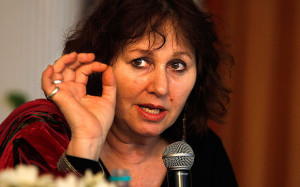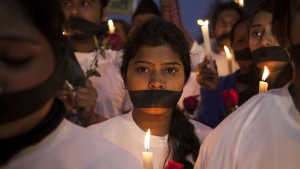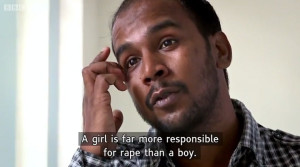India’s Daughter who shook the nation
By Neeru Saluja
The ghastly night of 16 December 2012 destroyed her existence. The gruesome incident gave her the name of ”˜Nirbhaya’ meaning fearless. She was Jyoti Singh Pandey, a 23 year old physiotherapy intern who was beaten and gang raped in a private bus in Delhi while travelling home with a friend.
The incident and the aftermath shook the country and led to a nationwide protest. Three years later, a British filmmaker Leslee Udwin makes a documentary on Nirbhaya called ”˜India’s Daughter’ which is scheduled to be broadcast on International Women’s Day. On 1 March this year, it is revealed the filmmaker had interviewed one of the rapists while being held in jail. The government bans the documentary. The film goes viral on YouTube unravelling the shocking interview of the rapist Mukesh Singh where he blames the victim for the rape.
While the documentary sheds light on the chauvinistic, backward and disturbing mindsets of the convicts behind such horrific crimes, we were keen to know what made Leslee travel to India to make this documentary. The documentary is being screened at the Bahamas International Film Festival. The Indian Down Under talked to Leslee at length to know more about what made her make Nirbhaya the central cause in her life.
Being a non-Indian and away from the incident, what inspired you to make this documentary?
It was 100 per cent the protests. The fact that I witnessed something in front of my eyes that was unique, something that has never ever happened before. It’s really important to understand that if those protests happened in any part of the world, I would have gone there to make the film. People ask me in a very childish and pathetic way, that why haven’t I made UK daughters? People don’t even know that I’m not British.
I made this film to amplify the protesters. I was so much in love with those ordinary women and men, the forward thinking people, for standing up for a better world for women. India is the only country which has had the courage to do this. Civil society demanding a change.
What was your objective behind making this documentary?
I had three objectives behind making this documentary. My first and foremost objective was to place the protesters at the heart of the film. They were the sign of opportunity and were the most beautiful and peaceful protesters. I wanted to amplify their voice.
Secondly, when I started my research there was no information about Nirbhaya. We didn’t know her name, all we knew was that she was a medical student who went with her friend to watch movie ‘The Life of Pi’. I wanted to know more about the life that we had lost. She brought so much value to the society. She wanted to build a hospital in her ancestral land and serve her people. I wanted to find out who Jyoti was and pay a tribute to her.
Thirdly, I had to interview the rapists. I had to understand them and how we could change them.
And what did you find out after interviewing the rapist Mukesh?
I did not only interview him. I interviewed seven rapists out of which four were involved in the case so I can practise and feel the anger before I interviewed Mukesh. I was amazed and shocked by their statements. I expected to meet monsters but these were human beings robotically programmed by the society. Mukesh’s interview was a solo narrative and by that time my anger was absent. He had no shame or remorse. According to him, boys and girls are not equal, that girls are destined for housework and to be married off. The lawyer was also a disgrace when we heard his statement.
Why do you think the documentary was banned?
The court says that I did not comply with the conditions of access imposed by the prison. I got permission from the DG Prisons and the Ministry of Home Affairs. I was shocked to know that many feminists supported the ban. This ban is bringing shame to India. When people from the international community see this film, they see the same admiration as I had for the protesters. But when they learn the film is banned their attitude changes 360 degrees. This ban must be lifted. I’m still funding this film from my pocket. I haven’t done it for money. I’m still carrying debts.
About three months ago, an MP was caught watching porn during a parliamentary sitting. In response to this embarrassment, the Indian government banned 897 pornography sites. The following week, Indian men screamed on social media asking for the ban to be lifted, saying we are a democratic country and can’t ban the stuff. Indian government lifted the ban while the ban still remains on my film. This is a confronting and conflicting message from the Indian government. I urge Modi government to lift the ban on ‘India’s daughter’.
The film was released in US in October. Hollywood stalwarts like Meryl Streep and Sean Penn praised your film. Did you get the same response from the film fraternity in India?
Yes there have been a few like Freida Pinto, Farhan Akhtar, Javed Akhtar and John Abraham who have supported my cause. But then there are a few eminent actors who have disappointed me like Aamir Khan. Where is his voice in all of this? He is a hero of indian people. He is the biggest star in India. Why is he silent about this? I had a conversation with him at a women world conference in America. I begged him to see the film while he was there. I sent him the link while he was in America knowing that it’s banned in India but never heard back from him. Jaya Bachchan doesn’t want to see this film and calls me a ”˜gori’. How can you criticise something that you have never seen?
Do you think people don’t talk about the film as it is a confronting issue?
I think they are afraid to talk about it publicly. And also don’t want to go against the Modi government. If the government saw the film it may not have been banned.
Do you think no one came forward when your film was banned because the fire died down after the incident?
Yes definitely. The fire has died down. More than a month ago, a two and half year old girl was gang raped by juveniles. A month ago, a four year old girl was gang raped and called the ‘Chhoti Nirbhaya’. Why? Because she was lying in Safdarjung Hospital, the very same hospital that Jyoti Singh, the subject of my film was lying in, and having the same operation to fit a colonoscopy bag, a three hour operation on a four-year-old girl only because she had been gang raped by three men. Where were the protesters? This is happening everyday. India needs to acknowledge the reality. I travel all across the world and India is the only country refusing to see the problem.
What message would you like to give when your documentary is shown at the festival?
The Bahamas Film festival is a wonderful film festival and I’m appreciative of their commitment to showcase my film. I’m still full of admiration for India. I’m committed to my cause and am now travelling the world as a human rights activist. It’s all about educating the heads not the heart. Every human needs to be taught from an early age respect, empathy, moral values, and the value of each and every human being. We need to have an equal mindset. The answer lies in time and the strong voice that believes in changing the society.
It was an inspiring talk with Leslee who has made some excellent India- centric films such as ‘East is East’ and ‘West is West’. India’s daughter is her first issue based film on the treatment of women and the mindset Indian men have towards women. She saw hope when she observed protest marches by ordinary Indians in support of Nirbhaya. Though once the film got made Leslee strongly feels let down by the Indian government and its biased attitude.
In Australia the film was already shown on television on ABC channel on Four Corner program in April this year. People who may have missed should look out and see it and pay their own tribute to a braveheart ‘Nirbhaya’ whose rape and terrible death should not go in vain and should help bring change in the mindset of Indians. No ‘Nirbhaya’ should ever happen again, anywhere in the world including India, we sincerely hope and pray.
Short URL: https://indiandownunder.com.au/?p=5913



